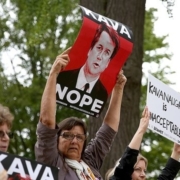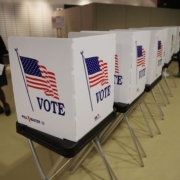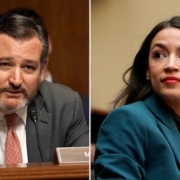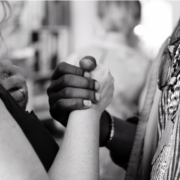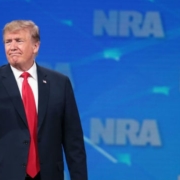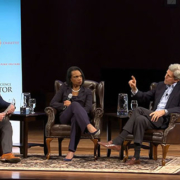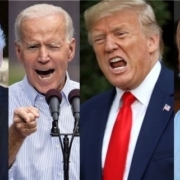Why America needs you to vote for candidates who cooperate, not partisans who fight
In this Opinion Editorial piece for USA Today, Common Ground Committee Co-Founders Bruce Bond and Erik Olsen make a case for why it’s so important for voters to identify and support candidates in the 2020 election who seek common ground on political issues.
 Voters need a new mindset that makes willingness to find common ground a “must have” quality for any candidate.
Voters need a new mindset that makes willingness to find common ground a “must have” quality for any candidate.
The “new normal” that defined 2020 has made its presence known this election season. The upcoming presidential debates will not have in-person audiences. Door-to-door campaigning has mostly vanished. One thing that hasn’t changed in this climate is the rabid partisanship that has been synonymous with our politics for more than a decade.
Elections are known for partisan bickering, and that has been on full display. But the issue goes much deeper. Negotiations over a second stimulus remain stalled and action now seems unlikely until after the election. After the killing of George Floyd, Republican Sen. Tim Scott’s police reform bill couldn’t get past even a procedural vote to begin debate. And most disturbing of all, partisan rhetoric has devolved into violence in cities like Portland, Ore., and Kenosha, Wisc.
To be sure, there are hints of cooperation on the federal level. Congressional leaders are attempting to revive negotiations following the shooting of Jacob Blake, as the nation cries out for action. A bipartisan group of lawmakers introduced the 2020 Health Statistics Act, which would improve our government’s efforts to fight the pandemic.
But when our disagreements turn into violence and critical legislation is stalled, we can’t afford piecemeal progress. Voters need a new mindset that makes willingness to find common ground a “must have” quality for any candidate.
Politics has always had some degree of hostility, but it has not always been such a lightning rod. In 1960, just 4% of Democrats and 4% of Republicans said they would be disappointed if their child married someone from the opposite party, according to the Inter-university Consortium for Political and Social Research. By 2018, that number jumped to 45% and 35%, respectively per Public Religion Research Institute.
Voters’ attitudes have shifted
This thinking has also seeped into our voting habits. After the 2018 midterms, Pew Research found that voters from both parties cited opposition to the other party as a reason for their vote, more so than support of that particular candidate. Just 10 years earlier, Pew found that votes for Barack Obama and John McCain were made primarily in support of those candidates.
It would be easy to solely blame our leaders for this shift. After all, the behavior we witness on a near daily basis on our screens or in our papers feeds into the idea that the other side is an enemy to be defeated rather than a potential partner. But politicians reflect the behavior they think voters want to see. It’s become clear that many see demonization as a required step along the path to victory.
To paraphrase Rep. Barney Frank, who spoke last year at an event hosted by our organization, Common Ground Committee, we are not calling for Americans to vote for candidates they don’t believe in. But we’ve reached a point where we need to strongly consider those who have demonstrated a commitment to working across the aisle — because what we’re doing now is not working.
Politicians who are not interested in hearing what the other side has to say are not interested in making progress, they are simply interested in getting their way.
If we had told you this time last year that most of our workforce was remote, or that the majority of Americans have rallied behind significant police reforms, you may not have believed us. A shift in thinking is never easy, but if there was ever a time, it’s this moment.
Consider actions, not just words
When you go to the polls in November or send in your mail-in ballot, don’t immediately flock to the candidate you think will best dominate the other side. Consider the individual who best represents your ideals but also knows that collaboration is essential in getting things done. Consider their concrete actions rather than just their words.
Find open-minded politicians with the Common Ground Scorecard
This new mindset will require a new set of tools to cut through the noise. That’s why we introduced the Common Ground Scorecard, a tool that measures the degree to which officeholders and candidates for elected office embody the spirit and practice of what we call Common Grounders — people who seek solutions through listening and productive conversation.
The same way voters would research where a candidate for public office stands on issues like climate change, the Scorecard provides a venue to see where they stand on common ground.
Along with the Scorecard, we urge voters to use other voting tools available to help them make informed decisions. Examples include Vote Smart, the Bipartisan Index from the Lugar Center and Ballotpedia.
The historic challenges our nation faces won’t be solved by partisan shots in the coming weeks and months. And they won’t be solved by treating this election like any other.
It is long past time to head to the polls with a new mindset that prioritizes solutions and ideas over demonization and tribalism. With new tools and thinking, we can begin to move the incentive needle away from demonizing the opposition and toward working together to make progress on the tough issues our nation faces.
Bruce Bond and Erik Olsen are co-founders of Common Ground Committee, a citizen-led initiative focused on demonstrating productive public discourse.
– This article was published in USA Today on September 17th, 2020.


